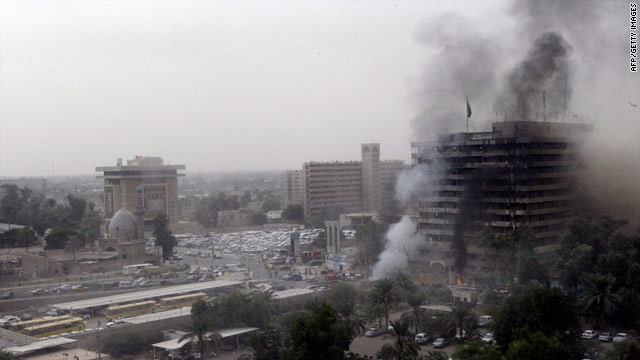Death toll past 100 in Baghdad bombings
Baghdad, Iraq (CNN) -- At least 132 people were killed and 520 wounded in twin suicide car bombings in central Baghdad Sunday, officials said -- the deadliest attack on civilians in Iraq this year.
Two car bombs detonated in quick succession near Iraqi government buildings about 10:30 a.m. Sunday, as the Iraqi work week began, an Interior Ministry official said.
Among the wounded were three American security contractors, the U.S. Embassy told CNN. The embassy would not give any more details.
One of the bombs exploded outside Baghdad's governorate building. The second was outside the Justice Ministry, about 500 meters (1,600 feet) away. The Ministry of Municipalities and Public Works, which is about 50 meters from the Justice Ministry, also sustained severe damage.
Iraqi Prime Minister Nuri al-Maliki surveyed the carnage shortly after the explosions.
"The cowardly attack that took place today should not affect the determination of the Iraqi people from continuing their battle against the deposed regime and the gangs of criminal Baath party and the terrorist al Qaeda organization, who have committed the most heinous crimes against the civilians,'" al-Maliki said in a statement.
Plumes of smoke billowed from the sites of the attacks as victims fled, some with blood streaming down their faces. The streets were strewn with debris, including charred cars and chunks of concrete from damaged buildings. Some government buildings and others in the area were heavily damaged.
The bombings came a day after the U.S. ambassador to the United Nations, Susan Rice, visited the country for the first time, and on the same day Iraqi officials were due to try to break a logjam holding up a new election law. Iraqis are supposed to go to the polls January 16, but parliament still has not passed the legislation, putting the balloting in limbo. The original deadline for parliament to pass the law was October 15, because Iraq's electoral commission says it needs 90 days to organize the process.
Iraq's parliament failed Wednesday to reach agreement on a new electoral law, so the issue was supposed go to the Political Council for National Security on Sunday. It is not clear if the bombings will derail the political council's discussions.
Al-Maliki vowed to punish "the enemies of the Iraqi people who want to spread chaos in the country and derail the political process and prevent the parliamentary elections from taking place as planned" in January.
He said holding the elections as scheduled would send the strongest response and message to the "enemies of the political process who are supported from the outside."
Susan Rice, the ambassador, completed a two-day visit to Iraq on Saturday that included a condolence stop at the Foreign Ministry, where a huge bombing killed more than 100 in August.
Security was tightened around Baghdad in the wake of the August 19 attack, which Iraqis dubbed "Bloody Wednesday." Blast walls were erected around the city and more checkpoints were set up.
Iraqi journalists grilled officials on TV on Sunday, demanding to know how the new attacks could have taken place given the new security measures.
An Iraqi official said the government was working to bolster security, but regional cooperation was needed to help fight suicide bombers.
"We are calling on international and U.N. envoys to come and find out why Iraq is being targeted this way," said Ali al-Dabbagh, the Iraqi government spokesman.
The spokesman said Iraq's setbacks are mainly caused by a fledgling intelligence that has "not been completed."
The European Union condemned "this terrorist attack" and sent its condolences to the families of the victims, the Swedish presidency said in a statement.
The Foreign Ministry, near the site of Sunday's blasts, was one of six places attacked on August 19. That day's attacks killed at least 100 people and wounded hundreds more. The area is close to the heavily guarded Green Zone that also houses the U.S. Embassy.
The August attacks shook confidence in the abilities of Iraqi security forces who took over securing urban areas from U.S. troops over the summer.
The Iraqi government has blamed Syria for harboring former Baath party members, who it said planned the August attacks, and asked for their handover.
Relations between the two neighbors were strained after the bombings. Each withdrew its ambassador from the other's country.
Security in the capital was tightened after the August bombings, and a decision to normalize the situation in Baghdad by taking down blast walls was reversed and checkpoints increased.
Iraqi and U.S. officials have warned of a possible increase in violence ahead of the country's national elections.



